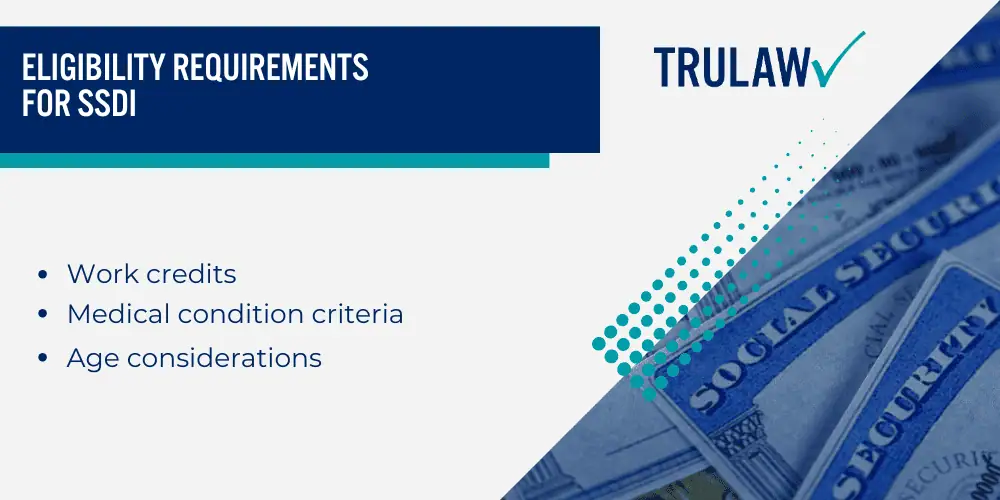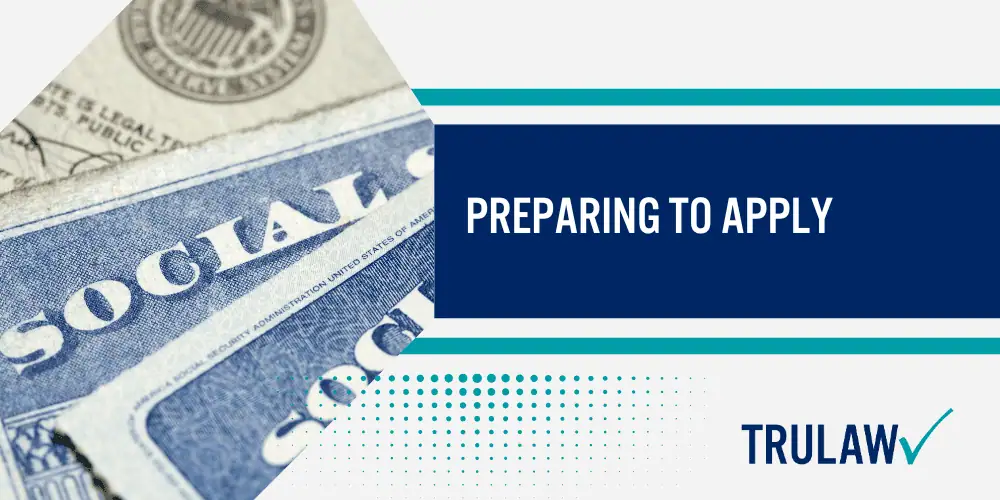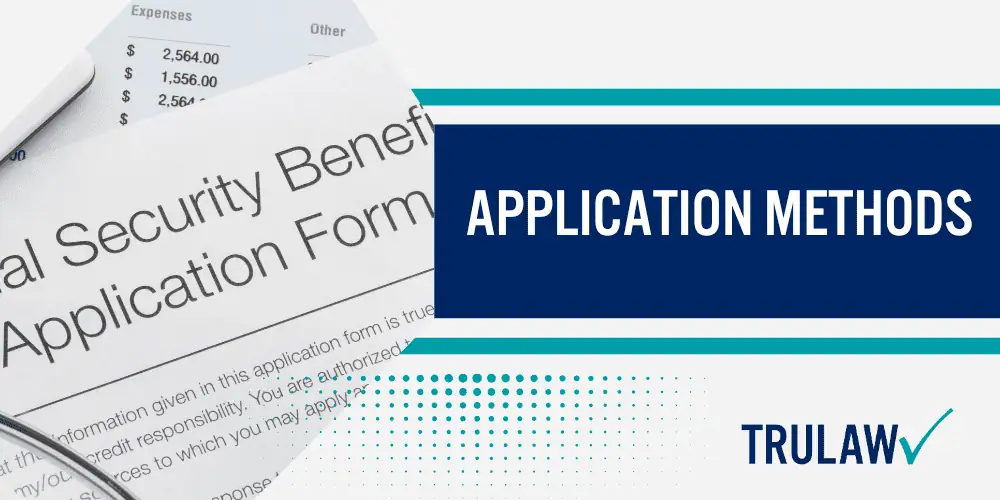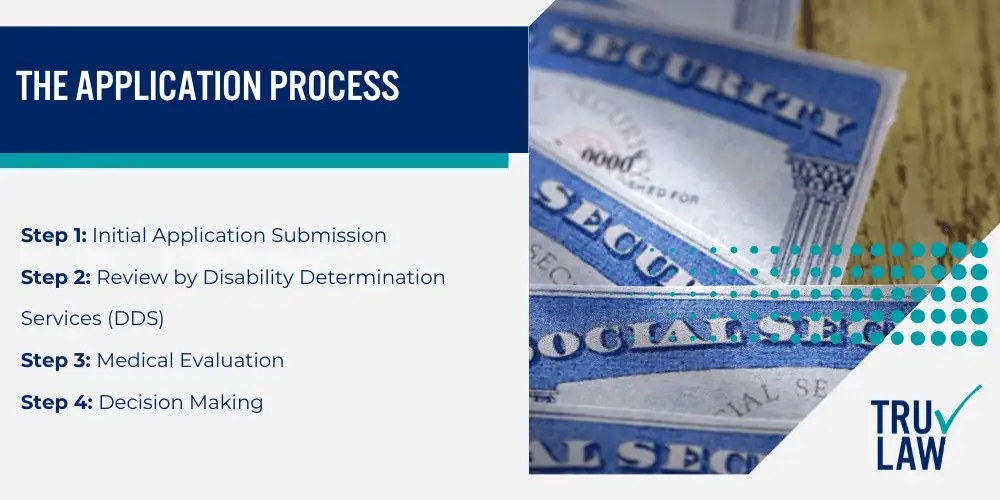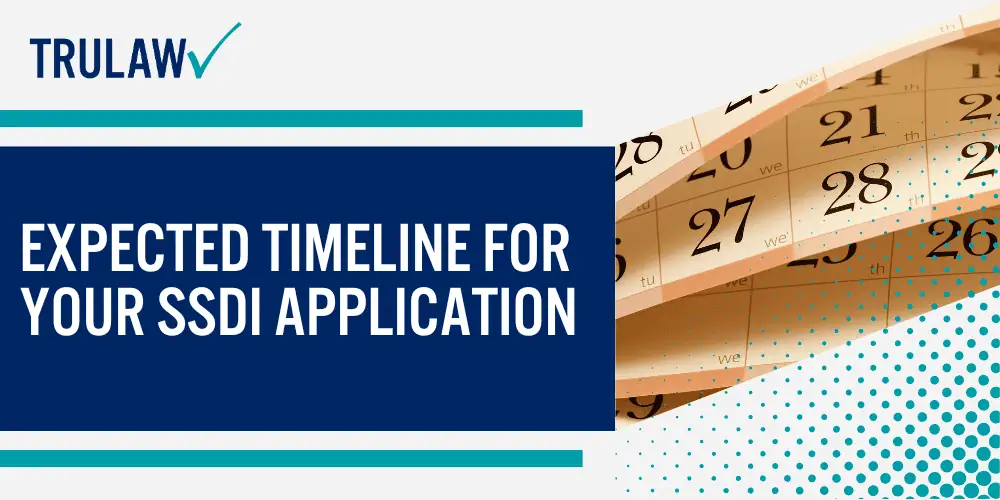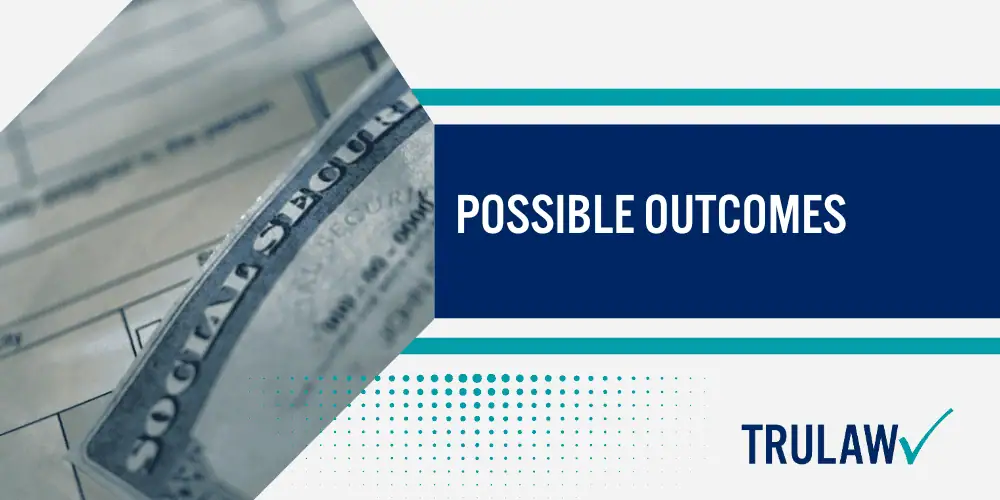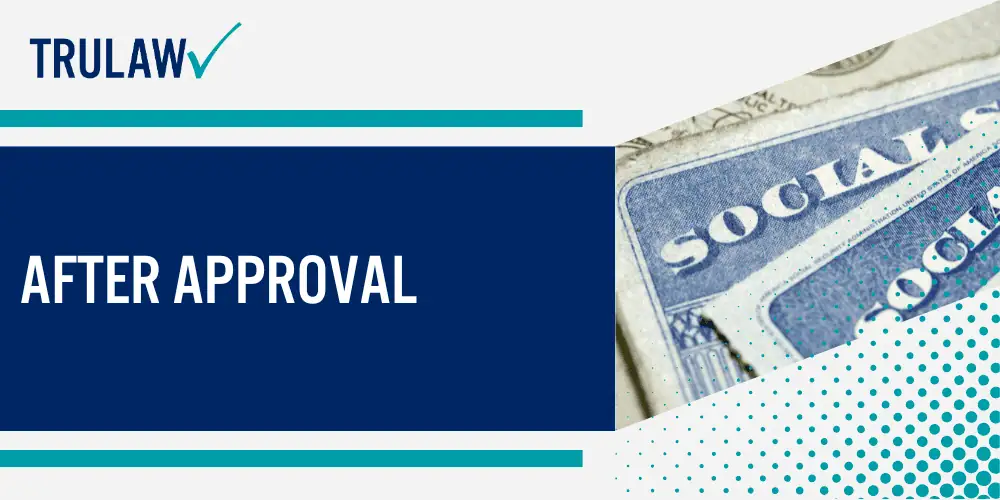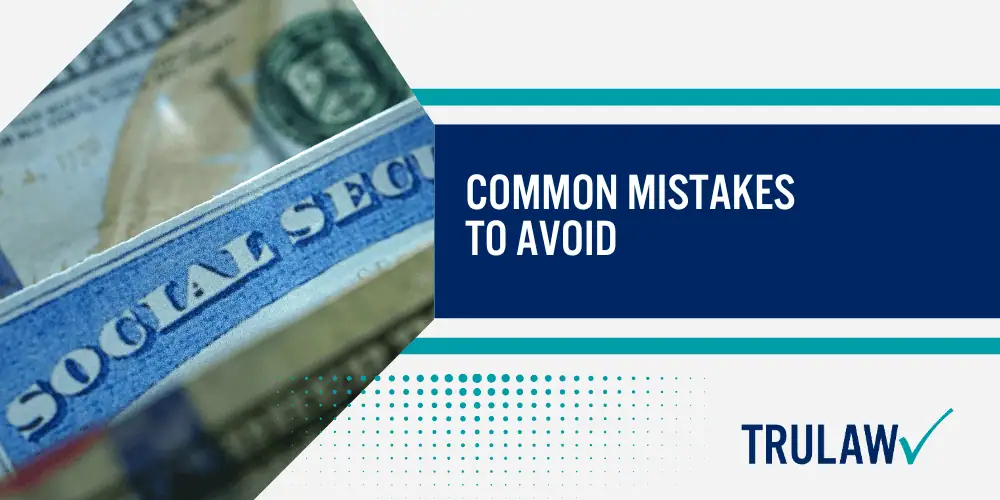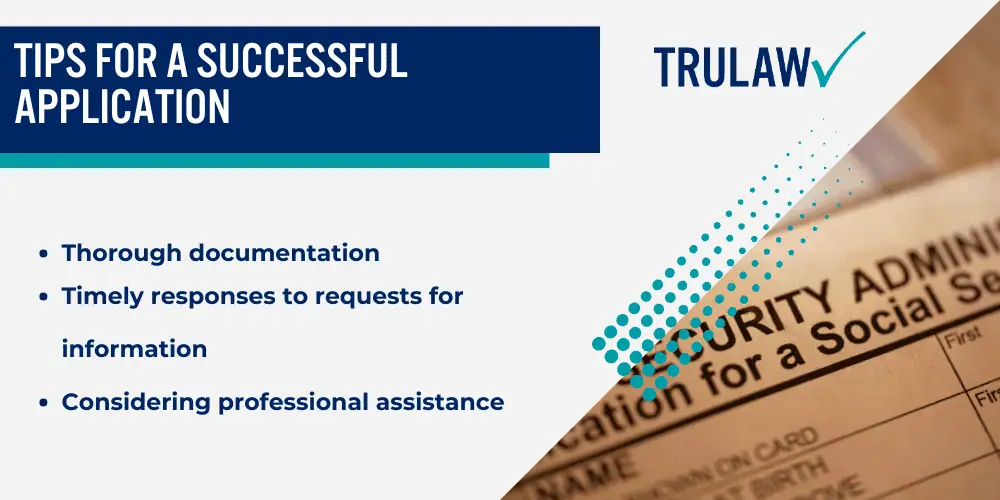SSDI Application Process
- Last Updated: June 12th, 2025

Attorney Jessica Paluch-Hoerman, founder of TruLaw, has over 28 years of experience as a personal injury and mass tort attorney, and previously worked as an international tax attorney at Deloitte. Jessie collaborates with attorneys nationwide — enabling her to share reliable, up-to-date legal information with our readers.
Legally Reviewed
This article has been written and reviewed for legal accuracy and clarity by the team of writers and legal experts at TruLaw and is as accurate as possible. This content should not be taken as legal advice from an attorney. If you would like to learn more about our owner and experienced injury lawyer, Jessie Paluch, you can do so here.
Fact-Checked
TruLaw does everything possible to make sure the information in this article is up to date and accurate. If you need specific legal advice about your case, contact us by using the chat on the bottom of this page. This article should not be taken as advice from an attorney.
Key takeaways:
- To qualify for SSDI benefits, applicants must have sufficient work credits, a severe medical condition that prevents substantial gainful activity for at least 12 months, and be below full retirement age.
- When applying for SSDI, gather comprehensive documentation, including detailed medical records, work history, and personal information.
- Although the SSDI application process is challenging, applicants can improve their chances by providing thorough documentation, responding promptly to information requests, and seeking assistance from a disability attorney or advocate.
The SSDI Application Process Explained
On this page, we’ll provide an overview of the SSDI application process, expected timelines for your SSDI application, eligibility requirements for SSDI, and much more.
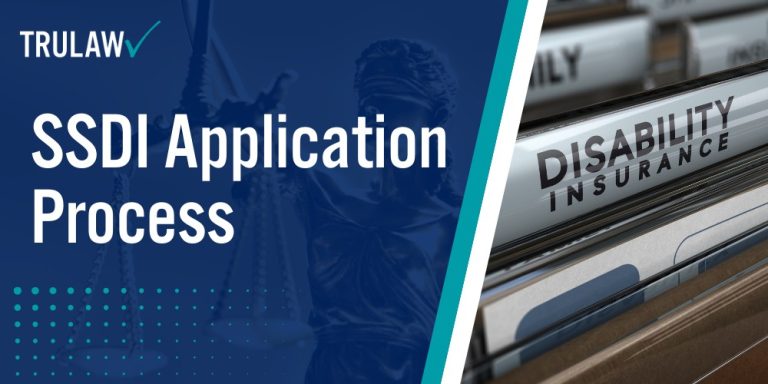
Intro to the Social Security Disability Insurance (SSDI) Application Process
Social Security Disability Insurance (SSDI) is a federal program that provides financial support to individuals who are unable to work due to a qualifying disability.
SSDI is funded through payroll taxes and managed by the Social Security Administration (SSA).
Understanding the SSDI application process is crucial for several reasons:
- Eligibility requirements are strict, and the process can be complex.
- Many initial applications are denied, often due to errors or insufficient documentation.
- A successful application can provide essential financial support and access to other disability benefits, such as Medicare coverage.
- The process can be lengthy, so being prepared and informed can help expedite your claim.
By familiarizing yourself with the application process, you can increase your chances of approval and ensure you receive the social security benefits you’re entitled to in a timely manner.
Table of Contents
Eligibility Requirements for SSDI
Work credits
To qualify for SSDI, you must have earned enough work credits through employment covered by Social Security:
- Generally, you need 40 credits, with 20 earned in the last 10 years before becoming disabled.
- You earn up to 4 credits per year based on your income.
- In 2024, you earn 1 credit for every $1,730 in wages or self-employment income.
- Younger workers may qualify with fewer credits.
Medical condition criteria
Your medical condition must meet the SSA’s definition of disability:
- The condition prevents you from doing substantial gainful activity.
- It has lasted or is expected to last at least 12 months or result in death.
- You must be under the care of a healthcare professional who can confirm the severity of your condition.
- The SSA uses a 5-step process to evaluate your disability claim.
Age considerations
While there’s no age limit for SSDI applications, age can affect eligibility:
- Applicants under 50 are considered “younger individuals” and face stricter criteria.
- Those aged 50-54 are “closely approaching advanced age” and may have an easier time qualifying.
- Applicants 55 and older are considered “advanced age” and have the most lenient criteria.
- The SSA considers age alongside factors like education and work experience when determining if you can adapt to other types of work.
Remember, meeting these eligibility requirements doesn’t guarantee approval.
The SSA thoroughly reviews each application to determine if you qualify for SSDI benefits.
Preparing to Apply
Gathering necessary documents
Before applying for SSDI, collect the following essential documents:
Medical records:
- Detailed medical reports from all treating physicians
- Lab and test results
- List of medications and dosages
- Dates of treatments and hospitalizations
Work history:
- Employment records for the past 15 years
- W-2 forms or tax returns from the previous year
- Pay stubs if you’ve worked after becoming disabled
Personal information:
- Birth certificate or proof of citizenship
- Social Security number
- Marriage and divorce records (if applicable)
- Names and birth dates of minor children
Completing the Adult Disability Report (Form SSA-3368)
The Adult Disability Report (Form SSA-3368) is a crucial part of your SSDI application:
- It’s an 11-part form that provides detailed information about your medical condition and work history
- Complete all sections thoroughly and accurately
- Include information on all physical and mental conditions affecting your ability to work
- List all healthcare providers, treatments, and medications
- Provide a comprehensive 15-year work history
- Use the “Remarks” section to add any additional relevant information
Tips for completing the form:
- Read all directions carefully before starting
- Gather all necessary information beforehand
- Answer all questions completely and honestly
- Consider discussing the form with a Social Security disability lawyer before submission
Remember, the Adult Disability Report is a critical component of your application, and errors or omissions can lead to delays or denials.
Application Methods
Online application
The online application is often the most convenient method:
- Available at www.ssa.gov/benefits/disability/
- Can be completed at your own pace
- Allows you to save progress and return later
- Available 24/7
- Suitable for most applicants aged 18-65
Phone application
Applying by phone is an option for those who prefer verbal communication:
- Call 1-800-772-1213 (TTY 1-800-325-0778)
- Available Monday through Friday, 8:00 AM to 7:00 PM
- A Social Security representative will assist you in completing the application
- Useful for those with difficulty using computers or the internet
In-person application at local Social Security office
For those who prefer face-to-face interactions:
- Find your local office using the SSA’s office locator tool
- Call ahead to schedule an appointment
- Bring all necessary documents to the appointment
- Ideal for complex cases or if you need immediate assistance
Regardless of your chosen method, be prepared with all the necessary information and documents before starting your application.
Each method has advantages, so select the one that best suits your needs and circumstances.
The Application Process
Step 1: Initial Application Submission
- Submit your application online, by phone, or in person at your local Social Security office.
- Provide detailed information about your medical condition, work history, and personal information.
- Include all necessary documents, such as medical records and work history.
Step 2: Review by Disability Determination Services (DDS)
- Your application is sent to the state DDS office for review.
- A disability examiner is assigned to your case.
- The examiner verifies non-medical eligibility requirements and develops medical evidence.
Step 3: Medical Evaluation
- DDS reviews medical evidence from your healthcare providers.
- If existing evidence is insufficient, DDS may arrange a consultative examination (CE).
- The examiner may consult with medical and vocational experts to understand your condition’s impact on your ability to work.
Step 4: Decision Making
- The DDS examiner evaluates your case using the SSA’s five-step sequential evaluation process.
- They assess your ability to perform substantial gainful activity, the severity of your impairment, and your capacity to do past work or any other work.
- A decision is made based on all available evidence and SSA guidelines.
- The case is returned to the local Social Security office for appropriate action.
- If approved, SSA will calculate your benefit amount and begin payments.
- If denied, you have the right to appeal the decision.
This process typically takes several months, and the outcome depends on the strength of your medical evidence and how well your condition meets the SSA’s definition of disability.
Expected Timeline For Your SSDI Application
Average Processing Time
The SSDI application process can be lengthy, with significant variations in processing times:
- Initial application: Typically takes 3 to 5 months.
- Reconsideration (first appeal level): Averages 7 months.
- Hearing before an administrative law judge (second appeal level): Averages 15 months.
In total, the process from initial application to final decision can take anywhere from several months to over two years, depending on the specific case and appeal levels required.
Factors affecting processing speed
Several factors can influence the processing time of an SSDI application:
- Completeness of application: Providing all necessary documentation upfront can expedite the process.
- Complexity of medical condition: Cases involving multiple or rare conditions may require more time for evaluation.
- Backlog at state agencies: High volume of applications can lead to delays in processing.
- Need for additional medical evidence: If the SSA requires more information or consultative exams, it can extend the timeline.
- Applicant’s age: Applications from individuals over 50 may be processed more quickly due to more lenient criteria.
- Geographic location: Processing times can vary by state due to differences in workload and resources.
- Appeals process: If initial applications are denied, going through appeals significantly extends the overall timeline.
To potentially speed up the process, ensure your application is complete, provide thorough medical documentation, and respond promptly to any requests for additional information from the SSA.
Possible Outcomes
Outcome #1: Approval
If your SSDI application is approved:
- You’ll receive a notice detailing your benefit amount and payment schedule.
- Benefits typically start the sixth full month after your disability onset date.
- You may be eligible for back pay if there was a significant delay in your application process.
- Medicare coverage will begin 24 months after you start receiving SSDI benefits.
Outcome #2: Denial
Approximately 65% of initial SSDI applications are denied.
Common reasons for denial include:
- Insufficient medical evidence
- Ability to perform substantial gainful activity
- Failure to follow prescribed treatment
- Disability is not expected to last 12 months or result in death
- Incomplete or incorrectly filled application
Appeal Process Overview
If your application is denied, you have the right to appeal.
The appeal process consists of four (4) levels:
- Reconsideration: A complete review of your claim by someone who didn’t take part in the initial decision. You have 60 days from the date of denial to request reconsideration.
- Hearing by an Administrative Law Judge (ALJ): If reconsideration is denied, you can request a hearing before an ALJ. This must be done within 60 days of the reconsideration denial.
- Appeals Council Review: If the ALJ denies your claim, you can request a review by the Appeals Council. They may deny the request, approve your claim, or return it to an ALJ for further review.
- Federal Court Review: The final level of appeal is filing a lawsuit in federal district court.
It’s important to note that each level of appeal has strict deadlines, and missing these can result in losing your right to appeal.
Many applicants find it beneficial to seek legal representation during the appeals process to improve their chances of approval.
After Approval
Waiting period
After approval, there’s typically a mandatory waiting period before benefits begin:
- The waiting period is five full calendar months from the established onset date of disability.
- Benefits start on the sixth full month after the disability onset date.
- There’s no waiting period for applicants with Amyotrophic Lateral Sclerosis (ALS).
Benefit calculation
Your monthly SSDI benefit is based on your lifetime average earnings:
- The Social Security Administration (SSA) uses a complex formula to calculate your Average Indexed Monthly Earnings (AIME).
- Your Primary Insurance Amount (PIA) is then determined using your AIME.
- In 2024, the average monthly SSDI payment is $1,489, with a maximum of $3,011.
- Your specific amount depends on your work history and earnings record.
Ongoing requirements
To maintain your SSDI benefits, you must:
- Participate in periodic Continuing Disability Reviews (CDRs) to verify your ongoing eligibility.
- CDRs typically occur every 3 years, or every 7 years for conditions unlikely to improve.
- Report any changes in your medical condition or work status to the SSA.
- Follow prescribed treatments and cooperate with SSA requests for information.
- Be aware that working above Substantial Gainful Activity (SGA) levels may affect your benefits.
Remember, SSDI is not necessarily permanent.
The SSA will periodically review your case to ensure you still meet the disability criteria and program requirements.
Common Mistakes to Avoid
Incomplete applications
One of the most frequent errors is submitting an incomplete application:
- Failing to provide all required information
- Leaving sections blank or marking them as “N/A” inappropriately
- Not including a comprehensive list of medical conditions and treatments
- Omitting details about work history or daily activities
To avoid this, carefully review your application before submission and ensure all sections are filled out accurately and completely.
Missing deadlines
Failing to meet crucial deadlines can severely impact your claim:
- Not submitting the initial application within the specified timeframe
- Missing the 60-day window to appeal a denied claim
- Failing to respond to SSA requests for additional information within the given time (often as short as 10 days)
Stay organized, keep track of all deadlines, and respond promptly to any SSA communications.
Lack of medical evidence
Insufficient medical evidence is a common reason for SSDI claim denials:
- Not providing up-to-date medical records
- Failing to include detailed reports from healthcare providers
- Omitting test results, imaging studies, or treatment plans
- Neglecting to obtain statements from doctors about your limitations
Ensure your medical records are comprehensive, current, and clearly demonstrate how your condition affects your ability to work.
By avoiding these common mistakes, you can significantly improve your chances of a successful SSDI application.
Remember to be thorough, timely, and provide as much relevant information as possible to support your claim.
Tips for a Successful Application
Thorough documentation
Comprehensive documentation is crucial for a strong SSDI claim:
- Gather all medical records, including test results, imaging studies, and treatment plans.
- Obtain detailed statements from your treating physicians about your condition and limitations.
- Keep a journal documenting how your disability affects your daily life and ability to work.
- Include records of any accommodations made at previous jobs due to your condition.
- Provide a complete work history, including job duties and reasons for leaving each position.
Timely responses to requests for information
Prompt communication with the SSA can expedite your application:
- Respond to all SSA requests within the specified timeframe, typically within 10-30 days.
- If you need more time, contact the SSA immediately to request an extension.
- Keep copies of all correspondence and note the dates of any phone conversations.
- Follow up if you haven’t received a response or decision within the expected timeframe.
Considering professional assistance
Seeking professional help can improve your chances of approval:
- Consult with a Social Security disability attorney or advocate who specializes in SSDI claims.
- Professional representatives can help navigate the complex application process and increase your odds of success.
- They can ensure your application is complete, deadlines are met, and your case is presented effectively.
- Many representatives work on a contingency basis, meaning they only get paid if you win your case.
Remember, a successful SSDI application requires attention to detail, persistence, and a thorough understanding of the process.
By following these tips and considering professional assistance, you can significantly improve your chances of approval.
TruLaw: Your Trusted Resource for Social Security Disability Insurance (SSDI) Benefits
Navigating the SSDI application process can be challenging, but understanding the key steps can significantly improve your chances of success:
- Ensure you meet the eligibility requirements, including work credits and medical criteria.
- Gather comprehensive documentation, including medical records and work history.
- Choose the application method that works best for you: online, phone, or in-person.
- Be prepared for a potentially lengthy process, which can take several months to over a year.
- If denied, remember you have the right to appeal the decision.
If you believe you’re eligible for SSDI benefits, don’t hesitate to start the application process.
The sooner you begin, the sooner you may receive the financial support you need.
At TruLaw, we understand the complexities of SSDI applications and appeals.
If your application for disability benefits has been denied, we’re here to help.
Our experienced team can guide you through the appeals process, ensuring your case is presented effectively and increasing your chances of approval.
Don’t let a denial discourage you from pursuing the benefits you deserve.
Reach out to TruLaw today for a free consultation.
We’re committed to advocating for your rights and helping you secure the SSDI benefits you need to support yourself and your family.
Remember, with the right approach and support, you can navigate the SSDI application process successfully.
Let TruLaw be your trusted partner in this important journey.
Social Security Disability Insurance Frequently Asked Questions
-
How do I know if I'm eligible for SSDI benefits?
To be eligible for Social Security Disability Insurance (SSDI), you must:
- Have a severe medical condition that prevents you from working for at least twelve (12) months;
- Have accumulated enough work credits; and
- Be under full retirement age.
You can use the Social Security Administration’s Benefit Eligibility Screening Tool to determine your eligibility.
-
What documents do I need to gather before applying for SSDI?
To apply for Social Security Disability Insurance (SSDI), you’ll need to collect essential documentation.
This includes comprehensive medical records, detailed work history, a certified copy of your birth certificate, your Social Security number, and financial information.
Additionally, prepare a list of all medications, treatments, and healthcare providers you’ve seen.
The Social Security Administration (SSA) offers an Adult Disability Checklist to streamline the process and ensure you have all the necessary information.
-
How long does the SSDI application process typically take?
On average, the SSDI application process takes 3-5 months to receive an initial decision.
However, if your claim is denied, the appeals process can significantly extend the timeline.
Depending on the number of appeals required, the total wait time can range from one (1) to three (3) years or more.
-
What happens if my SSDI application is denied?
If your SSDI application is initially denied, you have a 60-day window to appeal the decision.
The appeals process involves four stages: reconsideration, a hearing before an administrative law judge, review by the Appeals Council, and potentially a federal court review.
It’s important to note that a significant number of claims initially denied are ultimately approved through the appeals process.
-
Can I work while receiving SSDI benefits?
While receiving SSDI benefits, you can engage in some work activity.
The Social Security Administration (SSA) offers a 9-month trial work period during which you can earn any amount without impacting your benefits.
However, once the trial work period ends, your earnings will be evaluated.
If you earn more than the monthly earnings limit (currently $1,550 in 2024), your benefits may be reduced or terminated.
It’s important to understand these limitations and report any work activity to the SSA to ensure compliance with their guidelines.
-
Is Supplemental Security Income (SSI) the same as SSDI?
No, Supplemental Security Income (SSI) and Social Security Disability Insurance (SSDI) are not the same.
While both are administered by the Social Security Administration and provide benefits to people with disabilities, they have key differences:
- Eligibility: SSDI requires a history of work and paid Social Security taxes, while SSI is based on financial need.
- Funding: SSDI is funded through payroll taxes, whereas SSI is funded by general tax revenues.
- Benefit amounts: SSDI payments are based on your lifetime earnings, while SSI has a set federal maximum benefit.
- Medical coverage: SSDI recipients get Medicare after a 24-month waiting period, while SSI recipients usually qualify for Medicaid immediately.
- Asset limits: SSI benefits have strict asset limits, while SSDI does not.
Some individuals may qualify for both programs simultaneously, but they are distinct in their purpose and eligibility criteria.
-
Can I collect workers compensation and SSDI benefits at the same time?
Yes, you can collect both workers’ compensation and Social Security Disability Insurance (SSDI) benefits at the same time, but there are some important considerations:
- It is possible to receive workers’ compensation and SSDI benefits simultaneously if you qualify for both programs.
- However, there is a catch known as the “offset” or “reverse offset”. The total combined compensation from both programs is limited to 80% of what you were earning before becoming disabled.
- If your combined payments from workers’ compensation and SSDI exceed 80% of your average weekly wage, your SSDI benefits will be reduced.
- The offset ensures that your SSDI benefits will never be less than the amount you were awarded on their own.
- Workers’ compensation is typically provided on a more temporary basis than SSDI. If your workers’ compensation ends while you’re still receiving SSDI, you need to inform the Social Security Administration, as you may be eligible for higher SSDI benefits.
- It’s important to note that receiving workers’ compensation can affect your SSDI benefit amount. The sum of your SSDI benefits, workers’ compensation, and other government disability payments cannot exceed 80% of your average earnings.
Given the complexity of these rules and their potential impact on your benefits, it’s advisable to consult with a workers’ compensation or Social Security Disability attorney to ensure you maximize your benefits while complying with all regulations.

Managing Attorney & Owner
With over 25 years of legal experience, Jessica Paluch-Hoerman is an Illinois lawyer, a CPA, and a mother of three. She spent the first decade of her career working as an international tax attorney at Deloitte.
In 2009, Jessie co-founded her own law firm with her husband – which has scaled to over 30 employees since its conception.
In 2016, Jessie founded TruLaw, which allows her to collaborate with attorneys and legal experts across the United States on a daily basis. This hypervaluable network of experts is what enables her to share the most reliable, accurate, and up-to-date legal information with our readers!
Additional Social Security Disability Insurance resources on our website:
Here, at TruLaw, we’re committed to helping victims get the justice they deserve.
Alongside our partner law firms, we have successfully collected over $3 Billion in verdicts and settlements on behalf of injured individuals.
Would you like our help?
At TruLaw, we fiercely combat corporations that endanger individuals’ well-being. If you’ve suffered injuries and believe these well-funded entities should be held accountable, we’re here for you.
With TruLaw, you gain access to successful and seasoned lawyers who maximize your chances of success. Our lawyers invest in you—they do not receive a dime until your lawsuit reaches a successful resolution!
AFFF Lawsuit claims are being filed against manufacturers of aqueous film-forming foam (AFFF), commonly used in firefighting.
Claims allege that companies such as 3M, DuPont, and Tyco Fire Products failed to adequately warn users about the potential dangers of AFFF exposure — including increased risks of various cancers and diseases.
Depo Provera Lawsuit claims are being filed by individuals who allege they developed meningioma (a type of brain tumor) after receiving Depo-Provera birth control injections.
A 2024 study found that women using Depo-Provera for at least 1 year are five times more likely to develop meningioma brain tumors compared to those not using the drug.
Suboxone Tooth Decay Lawsuit claims are being filed against Indivior, the manufacturer of Suboxone, a medication used to treat opioid addiction.
Claims allege that Indivior failed to adequately warn users about the potential dangers of severe tooth decay and dental injuries associated with Suboxone’s sublingual film version.
Social Media Harm Lawsuits are being filed against social media companies for allegedly causing mental health issues in children and teens.
Claims allege that companies like Meta, Google, ByteDance, and Snap designed addictive platforms that led to anxiety, depression, and other mental health issues without adequately warning users or parents.
Transvaginal Mesh Lawsuits are being filed against manufacturers of transvaginal mesh products used to treat pelvic organ prolapse (POP) and stress urinary incontinence (SUI).
Claims allege that companies like Ethicon, C.R. Bard, and Boston Scientific failed to adequately warn about potential dangers — including erosion, pain, and infection.
Bair Hugger Warming Blanket Lawsuits involve claims against 3M — alleging their surgical warming blankets caused severe infections and complications (particularly in hip and knee replacement surgeries).
Plaintiffs claim 3M failed to warn about potential risks — despite knowing about increased risk of deep joint infections since 2011.
Baby Formula NEC Lawsuit claims are being filed against manufacturers of cow’s milk-based baby formula products.
Claims allege that companies like Abbott Laboratories (Similac) and Mead Johnson & Company (Enfamil) failed to warn about the increased risk of necrotizing enterocolitis (NEC) in premature infants.
Here, at TruLaw, we’re committed to helping victims get the justice they deserve.
Alongside our partner law firms, we have successfully collected over $3 Billion in verdicts and settlements on behalf of injured individuals.
Would you like our help?
